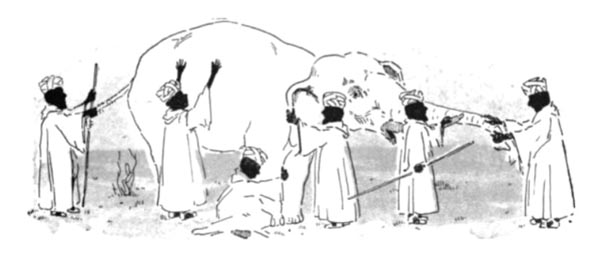 |
| The Blind Men and the Elephant (Wikipedia) |
Note: The famous Indian tale about six blind men "examining" an elephant and coming to very different conclusions was amusingly put into verse by a 19th-century American poet. Here's the story.
Get Ready: Do you believe that the way you see things is the way everyone does (or ought to)?
This story is very old and has been written down and told many times in many ways. One of the earliest is found in a Buddhist text said to date to the lifetime of the Buddha, around 500 BCE! But the one I'll share with you today is based on a "modern" poem by American poet John Godfrey Saxe (1816-1887).
You can read the full poem here.
It begins:
It was six men of Indostan
To learning much inclined,
Who went to see the Elephant
(Though all of them were blind),
That each by observation
Might satisfy his mind.
The tale is widely known as "The Blind Men and the Elephant." In Saxe's version there are six men, though the number varies widely. The next six verses recount in a humorous fashion the experience of each of the men.
"The First approached the Elephant" and encountered its broad, sturdy side. He exclaimed that the elephant "Is very like a wall!"
The second felt the elephant's "very round and smooth and sharp" tusk. He came to the conclusion, then, that an elephant "Is very like a spear!"
In the next stanza, we move around to the front of the creature. The third fellow encountered the elephant's "squirming trunk, " and declared that the beast was "very like a snake!"
Blind Man Number Four was down lower, feeling the animal's knee. It was very plain to him that the elephant "Is very like a tree!"
The fifth visitor took hold of the elephant's large, flat ear, and said that even "the blindest man" can tell that the elephant "Is very like a fan!"
The sixth and last examiner happened to be around the rear of the creature and, catching hold of its tail as it swung back and forth, decided that it "Is very like a rope!"
As you can imagine, the differences in perception led to some pretty serious squabbling. In the next stanza Saxe writes:
And so these men of Indostan
Disputed loud and long,
Each in his own opinion
Exceeding stiff and strong,
Though each was partly in the right,
And all were in the wrong!
The moral, of course, is that we each take our limited experience of the world to be adequate to make pronouncements about the nature of things. In the final stanza, Saxe asserts that this is especially true in religious discussions, in which people fight about "an Elephant / Not one of them has seen!"
--------Read more: https://en.wikipedia.org/wiki/Blind_men_and_an_elephant
Practice: Match the term to its definition below:
- disputed
- inclined
- Indostan
- perception
- pronouncements
- recount
- squabbling
- stanza
- trunk
- tusk
- arguing; quarreling
- a now-disused form of an old name for India
- the way we sense things; observation
- disagreed; argued
- leaned toward; favored
- formal or authoritative statements
- tell; narrate
- an elephant's long nose
- the long white tooth-like thing sticking out of an elephant's face
- a section of a poem; a verse
Answers are in the first comment below.
Submitted to the Shenzhen Daily for September 9, 2021


Answers to the Practice: 1. d; 2. e; 3. b; 4. c; 5. f; 6. g; 7. a; 8. j; 9. h; 10. i
ReplyDelete